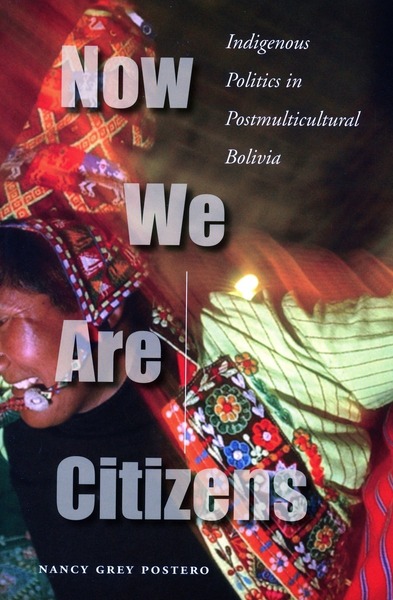
2006
312 pages.
from $30.00
Paperback now $15.00 (50% off)
Hardcover ISBN: 9780804755191
Paperback ISBN: 9780804755207
Upon winning the 2005 presidential election, Evo Morales became the first indigenous person to lead Bolivia since the arrival of the Spanish more than five hundred years before. Morales’s election is the culmination of a striking new kind of activism in Bolivia. Born out of a history of resistance to colonial racism and developed in collective struggles against the post-revolutionary state, this movement crystallized over the last decade as poor and Indian Bolivian citizens engaged with the democratic promises and exclusions of neoliberal multiculturalism.
This ethnography of the Guaraní Indians of Santa Cruz traces how recent political reforms, most notably the Law of Popular Participation, recast the racist exclusions of the past, and offers a fresh look at neoliberalism. Armed with the language of citizenship and an expectation of the rights citizenship implies, this group is demanding radical changes to the structured inequalities that mark Bolivian society. As the 2005 election proved, even Bolivia’s most marginalized people can reform fundamental ideas about the nation, multiculturalism, neoliberalism, and democracy.
About the author
Nancy Grey Postero is Assistant Professor of Anthropology at the University of California, San Diego. She is coeditor of The Struggle for Indian Rights in Latin America (2004).
"Postero's vantage point in a specific urban community enabled her to view Bolivian neoliberalism from below and to write an absorbing ethnography of reforms in action. . . Postero's reflexivity strikes just the right chord—her concise comments about herself are deftly woven into the narrative and come at just the right moment. Particularly striking is the discussion of how she gathered material from opposing sides during the land dispute. . . Postero presents a very readable account of a very disheartening situation."
—Jean E. Jackson, Latin American Research Review
"Postero's study offers a refreshing change from the national-level analyses that characterize much of the literature on indigenous politics by focusing on how state reforms are experienced at the local level... [Her] account of indigenous struggles in Bolivia is fascinating and a must-read for those with an interest in the field."
—Canadian Journal of Latin American & Caribbean Studies
"Nancy Postero's timely study points to events in Bolivia as part of a new historic moment with resonance beyond its borders... Postero builds on her valuable ethnographic study to make a powerful and subtly evidenced argument."
—Journal of Latin American Studies
"Postero documents the remarkable way the Guaranís have leveraged legislative changes meant to circumscribe their rights to fight for an expansion of those rights....Her account for the Guaraní struggle to find a voice in Bolivia's political process illuminates the long, rocky road many countries in Latin America face as they grapple with the question of how to reduce social inequality and poverty."
—BOOKFORUM
"Postero's research examines the interactions of [a Guarani] village's political leaders with a nongovernmental organization in their attempt to participate in the new political landscape... The work will be of interest to all social scientists and planners involved in questions related to racist exclusion, multiculturalism, neoliberalism, and democracy."
—CHOICE
"Postero has written a timely and intriguing ethnography of Bolivia during what she terms the new 'post-multicultural' moment. In this book, Postero offers an insightful historical discussion of Bolivian politics at local and national levels, and provides us with nuanced ethnographies of struggles over neoliberal and multicultural policies. This book will be an important reference for all those seeking to understand the contemporary dynamics of indigenous contestation in the lowlands and highlands of Bolivia."
—Maria Elena Garcia, Professor of Anthropology, Sarah Lawrence College, and author of Making Indigenous Citizens: Identities, Education, and Multicultural Development in Peru
"This important work provides a fascinating look at Bolivia's neoliberal multicultural moment, powerfully illustrating through in-depth ethnographic study how state policies of recognition and popular participation functioned to create acceptable indigenous citizen/subjects of neoliberalism. Even more importantly, Postero reveals the limits of this model of power relations, considering how it has set the stage for the coming moment in Bolivia and potentially in Latin America more broadly: the era of "post-multicultural citizenship." Both its timeliness and its insightfulness will ensure that this book is essential reading for those interested in Latin American politics, culture, and state-indigenous relations."
—Shannon Speed, University of Texas at Austin
"In her book, Nancy Grey Postero provides a thorough—and thoroughly compelling—guide to understanding the historical and cultural forces that have shaped Bolivian society and its peoples over the past several decades, leading to the election of Morales and the transformation of the Bolivian state...Postero's book is an accessible, lovingly crafted account that will be of interest to scholars of the Andes as well as to undergraduates and their professors, in a range of disciplines within Latin American studies."
—Journal of Anthropological Research
"Postero has certainly produced a first-rate account of an important chapter of Bolivian history...this book will be of great value to graduate and advanced undergraduate courses that seek to understand official multiculturalisms and its discontents."
—A Contracorriente